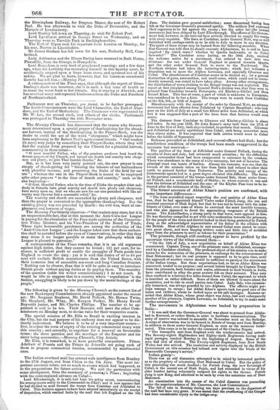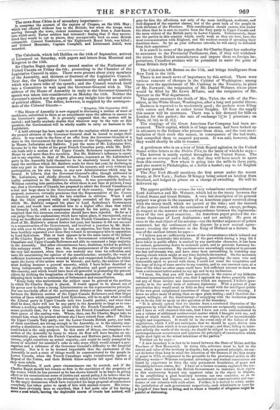The Indian overland mail has arrived with intelligence from Bombay
to the 27th August, and from China to the 7th June. The most important accounts relate, not so much to events which bad happened, as to the preparations for future activity. We cull the particulars with some abridgment, from the summary of yesterday's Times ; beginning with the contemplated advance on Cabal— Lord Ellenborough, it is said, had kept his policy secret, communicating his arrangements solely to the Commander-in-Chief; and it now appears that be had decided to send forward the troops from Candahar and Jellalabad to Cabal. This decision appears to have been adopted immediately on the receipt of despatches, which reached India by the mail that left England on the 5th Jane. The decision gave general satisfaction ; some discontent having been felt at the Governor-General's presumed apathy. The soldiers tad expressed their eagerness to be led against the enemy ; but the order for tbe onward.
movement had been delayed by Lord Ellenborough. The efforts of fe Govern.. ment had, however, in the interval been actively directed to supply the troops with every requisite. The force at Candahar, under General Nott, was so well furnished with carriage-cattle as to be able in July to move in any direction. The spirit of those troops may be learned from the following anecdote. When that General was told that he should evacuate Afghanistan, he is said to have inquired 'By which route ? whether by Quetta backwards, or to Cabal, forwards?' The Candahar army having, on the 30th July, received the welcome notice for a movement, was ordered to form into two, divisions : the one under General England to proceed towards Quetta. and the other under General Nott to move to the Northward. The Northern division had taken the battering-train; which fact indicates a disposition not to spare the Afghan fortresses, and especially Ghuznee and Cahill. The abandonment of Candahar seems to be decided on ; for a general destruction of guns, ammunition, and small-arms, which could not be conve niently removed, was slated to have taken place. Among other arrangements, the distribution of warm clothing to the Bengal troops was not neglected. The report at first circulated among General Notes division was, that they were to proceed from Candahar towards Ferozepore, via Khelat-y-Ghilzie and Dora Ismael Khan. This line of route, a part of which is unknown to Europeans, was considered to be but a feint. The troops were to march from Candabar on the 8th, 9th, or 10th of August.
Simultaneously with the receipt of the order by General Nott, an advance movement had been effected from Jellalabad by Captain Broadfoot ; who took post on the 24th of July at a small fort fifteen miles from Jellalabad, at which fort it was supposed that a part of the force from that fortress would soon arrive.
The distance from Candahar to Ghnznee vid Kbelat-y-Gbilzie is about 240 miles. In the year 1839, Sir John Keane's army took from the 27th of June to the 21st of July, both days included, to perform that march. Ghuznee and Jellalabad are nearly equidistant from Cabot, each being somewhat more than ninety miles. It was expected that both armies would meet in Cabal before the middle of September.
Sickness prevailed at Jellalabad, and several officers had died; but the comfortless condition of the troops had been much exaggerated in the accounts last received—
The position of the force at Jellalabad under General Pollock, during the months of June and July, had attracted much attention ; for the difficulties which surrounded them had been exaggerated to extremes by the croakers.
There was abundance in the camp of every necessary, but not of luxuries. The principal want was beasts of burden. Among the rumours, was one that the owners of the animals taken on hire from India had refused to allow their cattle to proceed further than Peshawar. The activity and energy of the Government agents had in a great degree obviated this difficulty. The forces in the garrison consisted of the troops under General Sale, those under General Pollock, and a considerable body of Siekhs; to whose custody it was said that the fortress of Jellalabad and the care of the Kbybet Pass were to be intrusted after the retirement of the British."
The former accounts of Akbar Khan's position are confirmed, with some important differences— "The most accredited report respecting the real position of Akbar Khan was, that he had appointed himself Vizier under Futteh Jung, the son and
nominal successor of Shah Sujah but that he was not in favour with the inha
bitanta of Cabal, over some of whom he exercised the most horrible tyranny, and who also appeared to dread the approaching vengeance of the British troops. The Kuzzilbashes a strong party in that town, were opposed to him. He was therefore compelled to act with some moderation towards the prisoners, for the people of the town and district looked to their being protected by Futteh Jung as the acknowledged representative of his father in the alliance with the British. Most of the Afghans in and around Cabul were stated to entertain great alarm, and were begging written notes and little bits of scribbled paper from the prisoners to serve as tokens for their preservation."
The prisoners, though still confined, appear to have profited by the uncertain views of the tribes around them
" On the 13th of July, a new negotiation on behalf of Akbar Khan was commenced. Captain Troup, one of the prisoners came to Jellalabad, accompa nied by a Candahar chieftain. The professed object of his mission was to make terms for the restoration of the prisoners, in exchange for the reinstatement of Dost Mahommed ; but its real purpose is supposed to be to gain time, until the approach of another winter should he sufficient to paralyse the movements of the Indian troops. But those negotiations had, as far as Akbar Khan was concerned, tended to no purpose; ancr several letters brought by Captain Troup from the prisoners, both females and males, addressed to their friends in India,
have contributed to allay the great anxiety felt on their account. They were then confined in a fortress five miles distant from Cabul, the approach to which
is described as rather difficult. Some of them are allowed to move about the mountains, and to ride in small parties into Cobol. Lady Sale, who occasion,. ally botanized, was always guarded by two Afghans. The officers might perhaps manage to escape; but Akbar Khan's agents took too good care of the ladies and children, whom he looked upon as his safe hostages. Rumour asserted that Akbar Khan, whose great object was delay, had sent subsequently another of his prisoners, Captain Lawrence, to Jellalabad, to try to make some further arrangements."
The movements in Afghanistan were backed by preparatives in India " It was said that the Governor-General was about to proceed from Allahabad to Kurnaul, or rather Simla, in order to facilitate communications. The army of reserve was ordered to assemble in November next on the Sutledge. A corps of observation was to be formed in Scinde of troops sent from Bombay, in addition to those under General England, as soon as the 1110080011 terminated. This corps is to be under the command of Sir Charles Napier. "The transports sent from England with the reinforcements had mired.
The Seventy-eighth Highlanders and Eighty-sixth Regiments having made rapid passages, reached Bombay in the beginning of August. Some of the
men had died of cholera. The Twenty-eighth Regiment, from New South Wales, had also arrived. The resolution and activity displayed by the British Government on this occasion had infused new vigour into the whole of the Honourable Company's service." Indian gossip—
There was an odd discussion attempted to be raised by interested parties, as to the propriety of reinstating Oast Mabomed in Cabul. But the policy of this proceeding was much doubted ; for Futteh Jung, the new Sovereign of Cabul, is the second son of Shah Sujah, and had succeeded in virtue of his elder brother having voluntarily resigned his rights to the throne. Futteh Jung is now King, and admitted to be such by even the notorious son of Dost Mabomed.
An examination into the causes of the Cabal disasters was proceeding under the superintendence of Mr. Cameron, the Law Commissioner. The fall of rain in Bombay during ten days previous to the departure of the mail had been very great. It was stated that the overflowing of the Ganges had done considerable injury to the indigo-crop. The news from China is of secondary importance— It comprises the account of the capture of Chapoo, on the 18th May ; which was effected without loss to the British; but when the troops were moving through the town, violent resistance was made from a Joss-house, i into which some Tartar soldiers had retreated: fearing that f they surrendered they would be cut to pieces, they unexpectedly fired on some British companies. Colonel Tomlinson, of the Eighteenth Royal Irish, was killed ; and Colonel Mountain, Captain Campbell, and Lieutenant Jodell, were wounded.



























 Previous page
Previous page